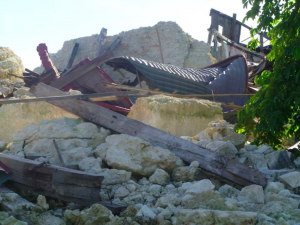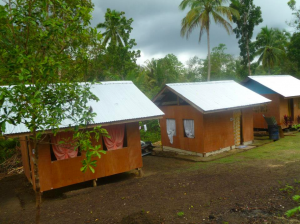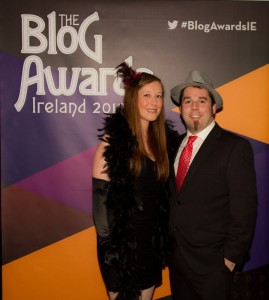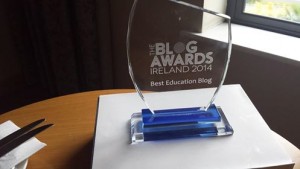Sometimes I’m pretty dim. Take for example, three weeks ago at the ICTedu conference. Saturday morning, the Minister for Training and Skills Ciaran Cannon opened the conference, then I got up and did my (first ever) keynote.
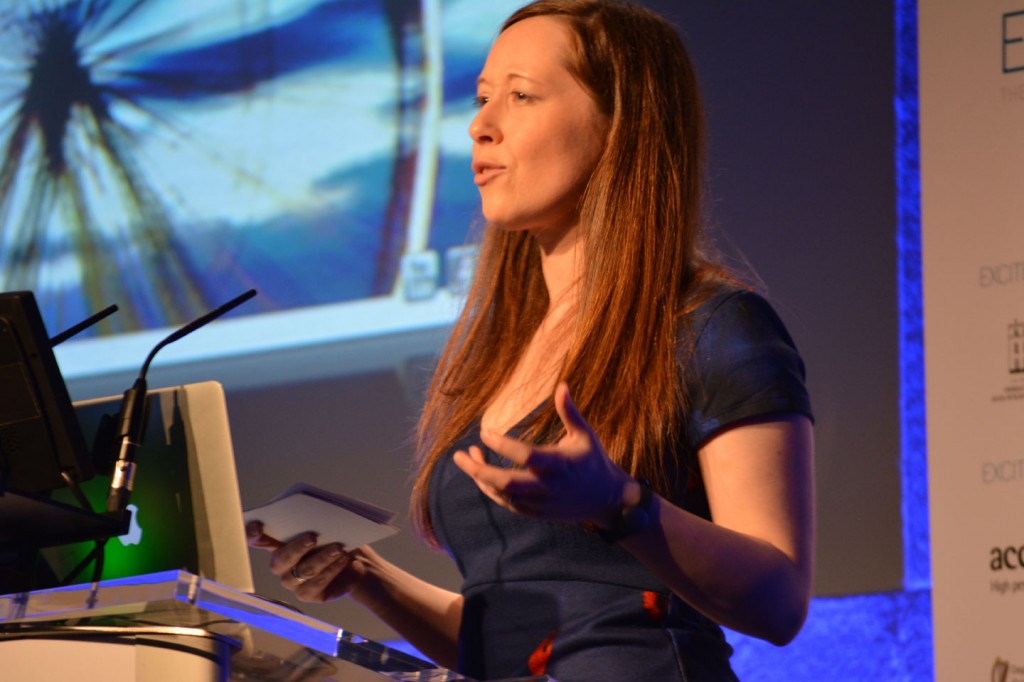 When I sat down he complimented me on my thought-provoking talk, double-checked the name of the book I’d recommended (“Teacher Proof” by Tom Bennet if anyone’s interested), asked if I’d heard about the ExcitED movement/conference at the end of the month (if you’re a tweacher on twitter, you’d want to have been living under a sound-proof boulder not to have heard about it) and politely said he’d love to have me there.
When I sat down he complimented me on my thought-provoking talk, double-checked the name of the book I’d recommended (“Teacher Proof” by Tom Bennet if anyone’s interested), asked if I’d heard about the ExcitED movement/conference at the end of the month (if you’re a tweacher on twitter, you’d want to have been living under a sound-proof boulder not to have heard about it) and politely said he’d love to have me there.
So here’s the bit where I’m pretty dim. I thought I was just being invited to attend! It wasn’t until the next day when the provisional schedule was emailed to me with my name pencilled in for a keynote that the penny dropped with an almighty clunk in my teeny little brain that I was being asked to speak.
Perhaps it’s the Irish tendency towards suspicion of authority figures (which, let’s face it, is quite ridiculous on my part – as a teacher I’m an authority figure myself!) but I approached the conference with some trepidation, as well as excitement. It seemed unclear what the balance of attendees would be, as a mix between international speakers, techies, edtech companies, policy makers and educationalists looked like the eclectic target audience. Unsurprisingly, I’m most in my comfort zone addressing other teachers so the prospect of the unknown was a little daunting. And more than once I had heard concerns muttered amongst my tweacher friends (and I had done some muttering myself) that perhaps this would be one of those events where tech people look down their noses at teachers, tell us we’re doing a terrible job (we’ve heard that one before), that we don’t ‘get it‘, need to ‘get with it’ and that the solutions are very simple; all involving technology permeating every aspect of the educational experience. I’m sure I sound cynical, but don’t forget, there’s a major financial incentive for the tech industry if you can convince governments worldwide that their education system is broken and the only way to fix it is with technology!
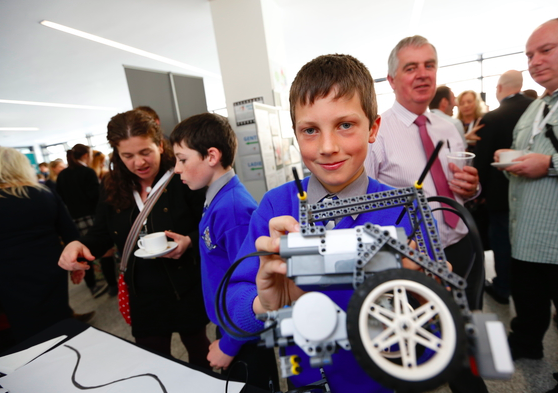
Thankfully my concerns about the conference – if not about the bigger picture – were unfounded. Friday and Saturday were a celebration of the remarkably innovative and creative projects students and teachers engaged in this year all over Ireland. In fact, it was not dis-similar to the Féilte event organised by the Teaching Council and the Learning Walk which was such a highlight of ICTedu. The speakers were challenging but never insulting; the panelists were a wonderful mix of students, teachers, experts and innovators and the genuine palpable passion in the air was a lovely thing to breathe in and behold.
I was utterly blown away by the BT Young Scientist winners Ciara, Sophie and Emer, who articulated the vision students have for blended learning (which they collected and collated at the festival). I was also deeply impressed by the panel contributions of Adrienne Webb (CESI chairperson), Mags Amond (CESI exec member and innovative secondary teacher) and Bianca Ní Ghrógáin (the most creative primary school teacher I’ve ever come across). If I hollered from the audience spontaneously, please excuse me! I get a bit rowdy when I’m excitED 😉
As with every event you give your weekend over to, you want to feel as if you emerge having learnt something, having met some really fascinating people and with questions and challenges bubbling in your brain. On this front, it certainly didn’t disappoint. Three people in particular challenged me to re-assess some of the things I have embedded so deeply in my psyche that I no longer view them as even being open to debate.
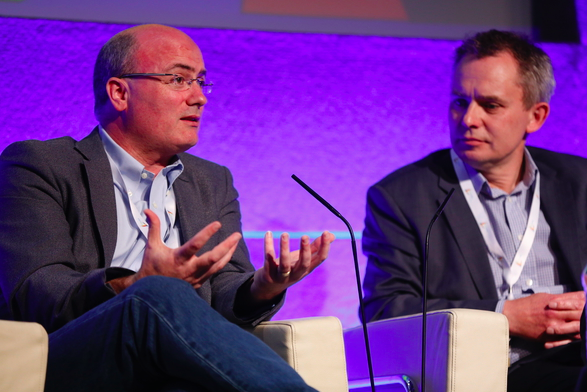
Mike Ferrick, founder of Alison.com was perhaps the most provocative panellist, confidently proclaiming the death of the traditional classroom and challenging us to consider schools as being in competition with the internet. He believes that problems of non-attendance will loom large in the very near future, as students realise that they can learn a hell of a lot more if they stay home from school and take charge of their own learning via the internet! I can list many reasons why I disagree with him – schools provide structure, motivation, interaction, social support – but I’m sure he could just as easily argue back that these features are being developed, rapidly, in online learning environments.
Instead of dismissing him as a crank, or a profit-hungry entrepreneur, I want to sit down with this man and have him show me what he sees right now that I can’t see. Because what struck me most forcefully about him was his absolute certainty. I want to understand why his faith in digital learning is so powerful that schools in his mind are already obsolete. And once I can understand this, once I can see what he sees, perhaps I can harness things I don’t yet know exist to help my students’ learning.
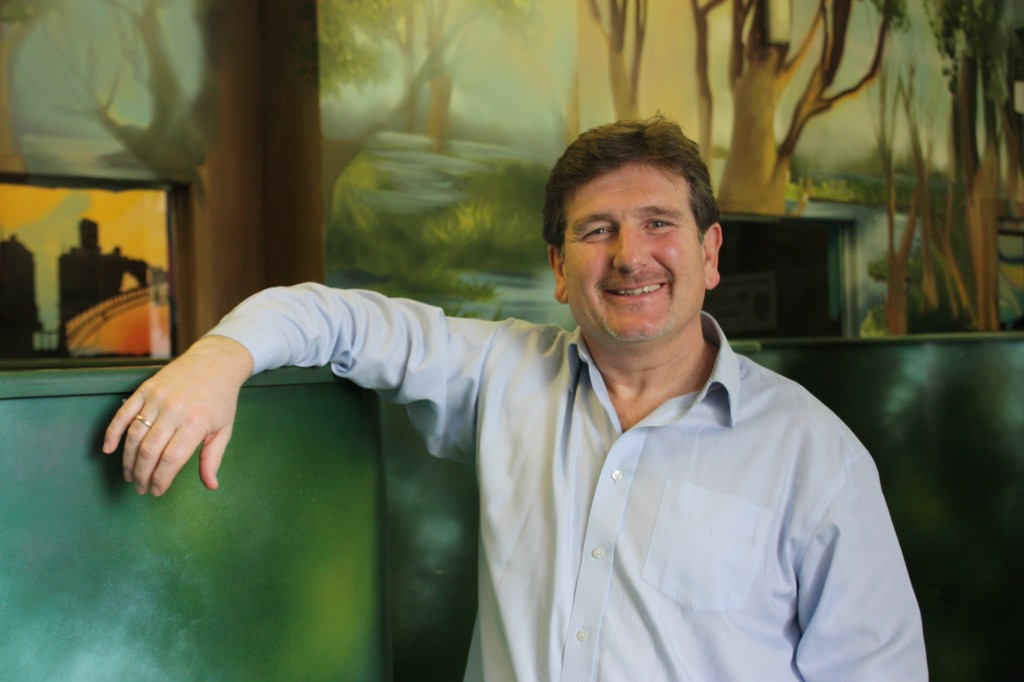
I also had a provocative challenge from Ciaran Bauer of Bridge21 during the round table sessions where we offered our suggestions for the National Digital Strategy for Education. The teachers at our table, including yours truly, immediately got stuck into the nitty gritty niggles and practicalities which make the integration of IT into the school and the classroom so time-consuming and difficult. Our concerns are genuine; as one of our number observed, it’s hard to get into the flow of competing in the Mathletes challenge when the internet connection keeps dropping to nothing every five minutes and I know I could give a hundred similar examples of where the petty obstacles to integrating edtech become so great (and they are generally so bloody stupid too) that you just give up in frustration. We’re certainly a long long way from tech as an invisible tool, like water from a tap, that’s always there when you switch it on (I can’t remember who gave this analogy but I liked it!).
But it was at this point that Ciaran suggested to us that a failure of imagination was what was holding us back; that we needed to get creative; that the solutions are there waiting to be discovered. That teachers need to stop looking at what’s NOT possible and making excuses and start dreaming of what is. Then find a way. Although at the time I felt quite annoyed with him, and a bit judged and mis-understood, having had a day or two to reflect, I think he had a point. Way back when I began using tech in my teaching, it was because Catherine Cronin had said something very similar, albeit in gentler language, to look for the white spaces, to find what is possible even in situations where so much seems impossible. That was the catalyst that led me to the point I’m at now and it’s a journey I’m very thankful I embarked upon!
I need to ferment some ideas around making the impossible possible a bit more but suffice it to say that there’s a room in our school that desperately needs to be re-vamped into a creative space, with computer pods and couches and beanbags and right now there is no money. We have the space, we have 7 computers and we have the vision. We need three more computers; a carpenter to rip out rows and build some pods; some comfy seating and the money to pay for these things. I’m starting to wonder if there isn’t perhaps some kind of sponsorship deal out there to make it happen? Although it was acknowledged on the day that the very idea of educational philanthropy is still relatively alien in an Irish context, could it really be as simple as Ciaran seemed to suggest? Create a compelling proposal, then hound potential investors until one of them – or some of them – come on board? Hmmm. I’m not sure…
Anyone out there want to transform one room in our school? I’ll give you all of the credit and LOTS of publicity…plus my undying gratitude as an extra bonus?
I await your response!
Yours in anticipation,
Evelyn O’Connor
Finally, I was fascinated by the adaptations people offered to my not-at-all-original outline of the skills we’re told students need to develop, consisting of the three C’s – creativity, collaboration and critical thinking. Tricia Kellegher suggested adding in communication and curation. Her suggestion was partially echoed later in the day when I was lucky enough to grab a quick chat with Marty Cooper. For him, it all comes down to people developing the confidence to communicate their message clearly. It didn’t go over my head that here is the man who invented the mobile phone suggesting that the most important skill we can teach is clear communication! It also fired some kind of synapse in my brain, making me recall that Bill Liao, co-founder of coderdojo, had tweeted earlier in the day that the c he’d suggest adding to my list was Computational Thinking.

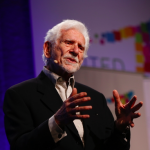
 Now I was starting to see a pattern. The inventor of the mobile phone values communication about all else; the co-founder of a movement to teach young people to code values computational thinking; and my keynote raised concerns about edtech devaluing or undermining critical thinking. When you consider that my final year extended essay focused on the later novels of George Orwell, including 1984, it’s not surprising that I value critical thinking above all else. After all, being able to think critically about the world is what enables us to question those in power – a process that I believe should be on-going and never-ending.
Now I was starting to see a pattern. The inventor of the mobile phone values communication about all else; the co-founder of a movement to teach young people to code values computational thinking; and my keynote raised concerns about edtech devaluing or undermining critical thinking. When you consider that my final year extended essay focused on the later novels of George Orwell, including 1984, it’s not surprising that I value critical thinking above all else. After all, being able to think critically about the world is what enables us to question those in power – a process that I believe should be on-going and never-ending.
Yet during our panel discussion, memorably for me, Bill Liao challenged us to consider that maybe there’s more to being educated than only developing the ability to think critically. And suddenly it was like a light switched on inside my head. I’m doing good things by giving my students the opportunity to be creative and to communicate and to collaborate and if our focus isn’t on critical thinking 100% of the time during the school year, that’s ok too.
You’d be forgiven for muttering to yourself right now ‘she’s right you know, she really can be quite dim sometimes‘ because this seems so bloody obvious. But I think my own personal preferences and talents and the system I grew up in taught and measured and valued little else except critical thinking, although I’m willing to accept that this was perhaps my own fault for selecting all academic rather than practical subjects. I’m not for a second advocating that we ease off on getting students to develop critical thinking skills – I haven’t lost my mind completely – but that doesn’t have to be our exclusive focus ALL OF THE TIME. Basically I think the message Bill was offering, which is one I needed to hear (and perhaps I’m just putting words in his mouth now, in which case I apologise) was that we need to re-conceive what we value; to widen the scope of what we value.
How wide should be widen our focus? Well perhaps we could begin with creativity, collaboration, communication, curation and critical and computational thinking?
The other thing I kind of want to clarify, is something I said during the panel where I mentioned that I felt it was mostly the middle class students I teach who were accessing and using my site. I then said we should all be thankful for having grown up in a home where education is valued. I’d be concerned that anyone would conflate the two and think that I was offering the patronising view that only middle class families value education, which is a trend, certainly, but by no means a given.
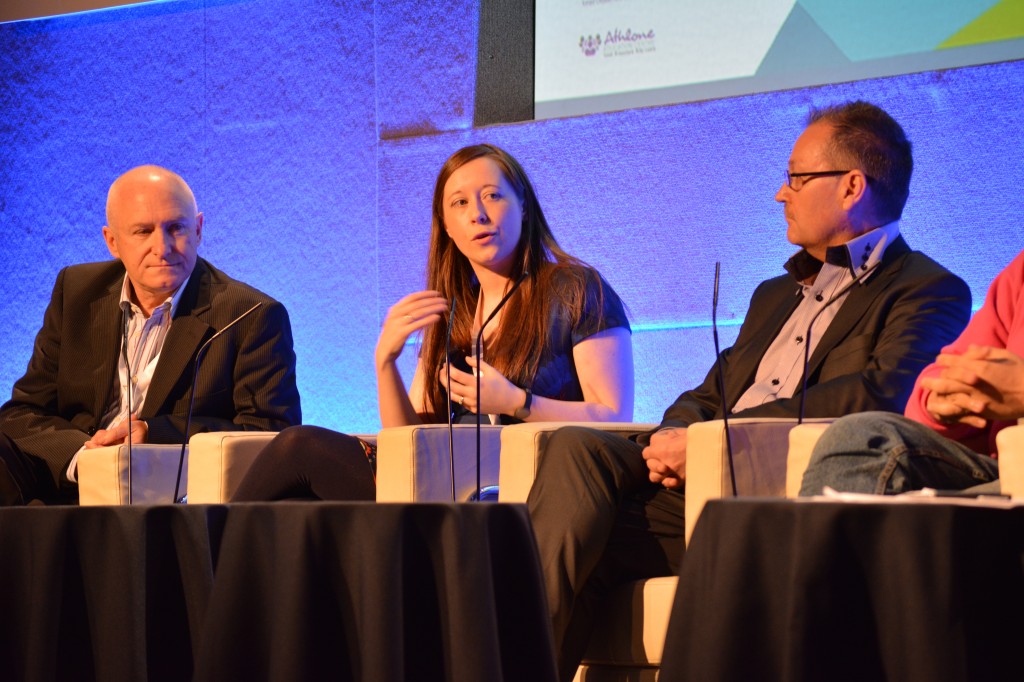
It would also do an injustice to my own parents to imply that somehow I grew up in a comfortably well off family of doctors or lawyers or teachers. My mum completed her Leaving Cert and at her father’s urging joined the Civil Service rather than follow her dream of becoming a hairdresser. It wasn’t much of a career move as she had to quit her job a few short years later when she married in April 1973; only months later the marriage ban was lifted, but it was too late for her. My dad left school after the inter cert and worked on building sites but an innate talent for numbers saw him move into accounts and he worked in various jobs before joining Mayo County Council as a revenue collector and working that job for over twenty years (oh the taunting I got at school about Zacchaeus the tax collector in the bible stories!). I’m the fourth of five children, yet despite the first four of us being steps of stairs, we all achieved a university education and two of us have Masters, in Film Studies (that’s me the lightweight) and Financial Maths (that’s David the heavyweight) respectively. So I guess my point is that a household where education is valued is far more significant and important than a household where money is comfortably available.
One final thing occurs to me. At ExcitED, teachers as subject specialists was quite a hot topic of dispute. There was a general vibe in the air that the old chestnut “primary teachers teach kids, secondary teachers teach subjects” is entirely true. I have to say, as someone utterly devoted to and consumed by my subject speciality, yet at the same time utterly devoted to my students, this blanket dismissal of the importance of subject expertise made me really uncomfortable. Think about the Mathletes participants, how important it was for them to get the encouragement to participate from their teachers, who are also, presumably, lovers of Maths. Think about the success of my own website, which exists, I firmly believe, because I communicate my passion for my subject. Or Marty Cooper’s obsession with communication and Bill Liao’s emphasis on the importance of computational thinking. It’s possible to be an obsessed subject specialist and a really caring teacher simultaneously!
Yet I will grant one thing here. I am most certainly waging a constant battle not to be biased against those who don’t love my subject; who don’t value the same things I value. I’m conscious of it and I try at all times to challenge it and minimise it but when people tell me they don’t like reading, I have to admit some small part of my brain starts to view them as alien life forms. I was heartened recently when I confessed this prejudice to my Principal and she laughed and admitted that she (a former PE teacher) finds it hard to understand people who don’t enjoy sport, or at the very least exercise. I wonder if I had asked Bill Liao, would he see people who don’t embrace computational thinking as missing out on half of the wonder of the universe? Or if Marty Cooper met someone who had taken a vow of silence, if he would see this person as nice, sure, but odd in the extreme?
The only other observation I have to offer here is this: when we drink from the fountain of knowledge, it does not matter what we like to drink or how we like to drink, only that we find the magic liquid that quenches our thirst and then instantly inflames it again so that no matter how much we drink of that fountain, our desire is never quashed, never lost, never drowned out, never squashed.
Maybe everyone has their own favourite drink and when they sup at the fountain of knowledge it tastes different for every individual person. Perhaps how they drink varies too – some gulp, some sip, some take their time, others swallow in one go and go for another and another and cannot be sated. Some drink standing up, others lying down. Some stick to the same drink but try different recipes, different vintages. Others never sup the same liquid twice, because there are so many flavours of knowledge in the world and so little time to savour them all.
Nonetheless, we must still admit that the difficult thing is FINDING your favourite drink and your preferred style of drinking from the fountain of knowledge in the first place. Students having to study a broad range of subjects is often criticised but a large part of me hesitates to embrace the idea that we should specialise earlier. We have our entire lives to devote to a narrow field of endeavour. Perhaps looking at the vast horizon, rather than zooming in with tunnel vision on one area, is to be desired rather than just being an end result of an outdated system.
Finally, do we have students who thirst for knowledge? I think far too often we whinge and moan that they do not want to learn. I’ve started to think of it like this instead: maybe they are thirsty – but just not for the same beverage (writing, writing, writing) every day! And once they find the thing they cannot get enough of, irrespective of how they feel about your subject, they will transform utterly and a tangible beauty will be born.
For fantastic coverage of the day, check out the Youth Media Team blog.
If you’d like to see photos, go to www.excited.ie
ps Oops – forgot to say congrats and bloody well done to the organising team of Minister Ciaran Cannon, Bernard Kirk and Frank Walsh. Bravo gentlemen!

